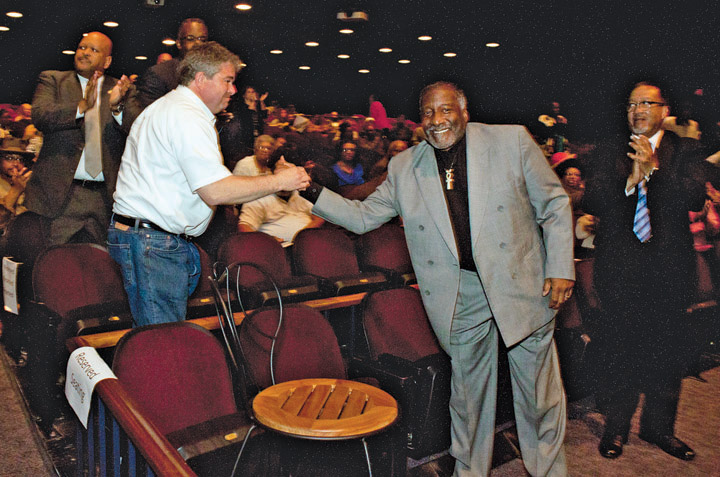Hundreds gathered at 9:30 a.m. on a Saturday to revisit a forgotten slice of local history.
“Pardons of Innocence: The Wilmington Ten” premiered at University of North Carolina Wilmington’s Kenan Auditorium on April 5.
The documentary was written, produced and directed by Cash Michaels of The Wilmington Journal, with support by the National Newspaper Publishers Association.
The film explores racial tensions in Wilmington that led to false convictions of arson and conspiracy for eight black high school students, a white anti-poverty worker and an activist from Oxford, N.C., in 1971.
Following the 1969–70 integration of New Hanover County Schools, black students felt scorned by new classmates and teachers. Fights between white and black students were common, resulting in suspensions and arrests for black students.
In January 1971, a group of high school students planned a boycott to voice complaints with help from Rev. Benjamin Chavis, an established young activist from Oxford.
When a grocery store near the students’ headquarters at Gregory Congregational Church, located on Nun Street, was firebombed on Feb. 6, 1971, violence engulfed the city. Based on testimony of three men who falsely claimed to be in the church that night, Chavis and nine others associated with the boycott were arrested.
No evidence beyond the testimonies was provided, yet the Wilmington Ten were convicted and sentenced to a combined 282 years in prison.
A few years after the trial, all three witnesses recanted. Despite national attention, including an Amnesty International attempt to repeal the case, the Wilmington Ten were not cleared of the crimes until Gov. Beverly Perdue issued a pardon in 2012.
Members of the audience, including surviving members of the Wilmington Ten, commented and asked questions after the film.
Michaels explained the intent of the film, saying it was created to educate young people.
New Hanover County Commissioner Jonathan Barfield Jr. questioned how much has changed in county schools.
“When you go to one school that has 11 black students and another has 98 percent black students, something is wrong with that picture. We as a community have got to demand what we want and make it happen,” Barfield said.
Chavis said the film should be a mandatory part of the curriculum in North Carolina public schools, adding that young people were not the only ones who need to see it.
“Not only do young people need to see this, but some of us need to see it who are not so young but have a bad case of amnesia,” Chavis said.
He said he needed to see the film to be reminded of the continued need for unity.
“This is a step-forward moment in Wilmington, across the state and also in America,” Chavis said.
email [email protected]




